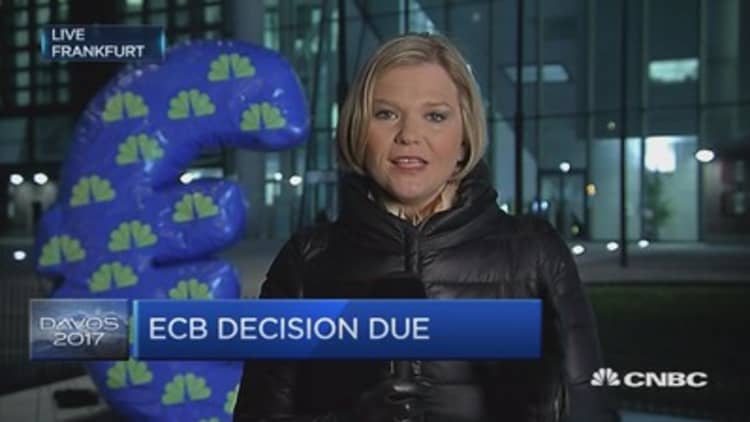
The European Central Bank will stick with implementing its monetary stimulus program and hold its fire at its meeting on Thursday. However, the focus for analysts and reporters looks set to be the growing dissent inside the bank's governing council about when to taper its massive bond-buying scheme.
"The press conference will be interesting, as Draghi should be asked about the growing dissent inside the governing council, documented by the latest minutes," said Felix Herrmann, Investment Strategist at Blackrock in Frankfurt in an email to CNBC.
"The controversy could even increase against the backdrop of very strong leading indicators in the euro zone which could rise to the arguments of Weidmann and co. to end the programme in the foreseeable future."
Businesses across the euro zone ended 2016 by ramping up activity at the fastest pace for five-and-a-half years according to the composite PMI index which rose to 54.4 in December, ahead of expectations. The weaker currency boosted demand for their goods and services in December.
"To put the PMI data into perspective, the five-and-a-half-year high reached in December is broadly consistent with factory output growing at an impressive annual rate of approximately 4 percent," said Chris Williamson, chief business economist at IHS Markit, the publisher of the PMI data in a statement.
At the same time, prices rose to its highest level since 2013, with annual inflation climbing to 1.1 percent in December, according to the European Union's official figures. On top of this, long-term market-based inflation have recently risen significantly. But core inflation, which strips out volatile energy prices, stayed below 1 percent supporting the case of the so called "doves" in the council.
"So far, ECB president (Mario) Draghi has emphazised that the ECB council has not yet discussed an exit. At the meeting on Thursday an internal debate seems likely at last."
Despite the announcement in December to reduce the monthly purchases to 60 billion euro after March 2017, Draghi does not want this to be called an exit to the program or tapering. He insisted that by extending it longer than the market had expected until the end of 2017, the purchase volume even was higher than expected and thus no start of tapering but an "adjustment" to the program.
"The dovish tone of the ECB is unlikely to change much from December. Despite better inflation data, Draghi is likely to stress the temporary influence of energy and the still-weak core inflation outlook," writes Anatoli Annenkov, Senior European Economist at Societé Generale Corporate and Investment Banking.
"The ECB's communication could be tested as early as the March meeting when data will likely have improved further boosting the inflation forecast and spurring calls for an end to unconventional measures."


